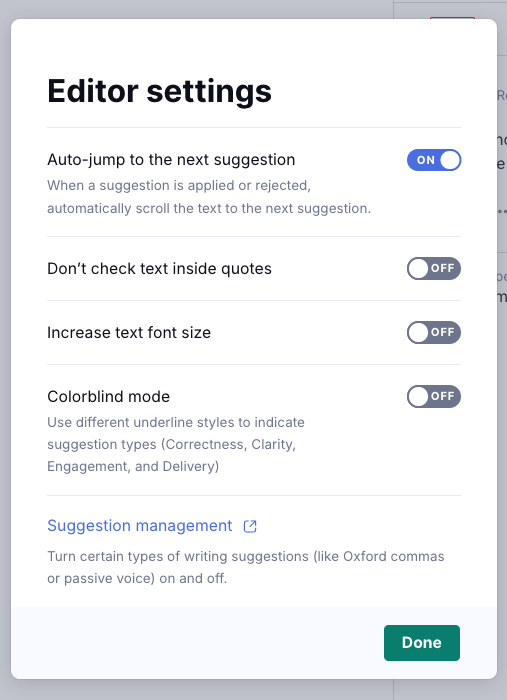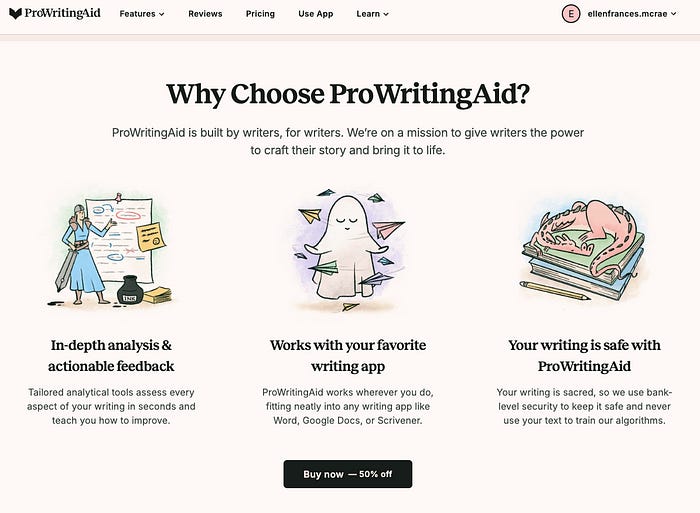Hey, welcome to Ellen Wrote A Book!
In this edition, you’re getting the following:
A deep dive into paying for Grammarly, specifically (yet, we can apply this to our other writing AI platforms)
My hacks for getting the most out of the free version
Addressing the issue of when to pay and when not to
Writers and Grammarly
Grammarly is one of those divisive programs. It can be a game changer for writers or a frustration they must overcome.
Especially as the premium features aren't free, Grammarly can seem like a rip-off — they take your money and fail to give us anything in return.
Well, I don't entirely disagree with the use of thinking that. It's not cheap, considering all the other expenses we have. And sometimes, I feel like it's doing absolutely nothing.
But other times, it’s been a professional lifesaver, and I’m willing to give the program every cent I have to thank it.
In my experience, Grammarly is entirely useless unless you do the following things with your writing.
Use Grammarly’s extension
When I first began using Grammarly, I used to import my articles into the program and edit through the online version. It looks like this, by the way:

It was easy for me to use the program like this; it's not like copying and pasting my text into the browser, which is an arduous task.
But considering there is now a browser extension for Grammarly, it's silly to use the manual way. It makes the entire process more frustrating than it needs to be when you do.
I’ve met many writers who’ve given up on using Grammarly because I thought the copy-and-paste system was the only way to use the program.
I'm grateful they’ve developed the extension. I also like that you can switch off the browser for certain websites, either for a short period or for eternity.
Exstention limitations
The only limitation with the extension I’ve discovered is that you don't get all the reports you did with the browser version. It's hard to see how you're tracking and measuring against your goals.
But with one quick click, you can open up the full version, and it's right there. I’ve never found this annoying enough to ditch the app; it hasn’t been a deal breaker.
If it is for you, however, ditch away.
Safety nets
It has made publishing online content far more manageable for me. It's like a safety net to ensure all blogs or emails are checked for spelling and grammar. The extension, being there, provides a constant reminder, and the coloured underlining shows me any errors.
I work by myself, with no editor on staff. How can I feel angry about a second set of eyes?
You can delete the extension if it annoys you. You can also turn it on and off for specific websites or during a single session of use.
But ignoring its functionality means you’re not engaging in the program's actual functionality, and that's just a waste of your time.
Paying up for Grammarly at the right times
Using Grammarly can be a challenge if you're using the free version.
Like all good apps, Grammarly offers different options for using its features. The free version comes with limited functionality, including a lack of access to the AI features.
The paid version has no restrictions and allows unlimited editing capacity.
I've always advocated for paying for Grammarly when you need it (the most, too).
If you're editing a manuscript, you should pay for it.
If you only need it to check the spelling and grammar of your Instagram captions, it's not worth the money.
But Grammarly is only useful if you're paying at the right time.
I had a period where I was editing articles using the free version. The articles ranged between two and three thousand words, and I wondered why I couldn't feel a distinct difference in my writing after using Grammarly.
It’s because they weren’t necessary for my writing work.
I contemplated ditching the app altogether in favour of something like ProWritingAid during this time.
I'm glad I've paid and tested both sides of the platform first-hand. It taught me a problem with having the free version versus the paid; you're constantly trying to find the right moment to hand over your money.

Get the spelling settings right
I'm someone who likes to skip through a lot of the setup with these types of applications. I get bored by filling in all my goals and objectives for using a spelling app.
It feels invasive when I'm just trying to start and finish what I'm there to do — edit my work.
But Grammarly has a learning curve if you ignore this initial setup.
A section on the website allows you to select the type of English you write. In my case, I need to select Australian English, which has different rules from British and American.
If I left it set to American English, I would’ve made typos in my writing. It would’ve picked up errors that weren’t actually errors.
That adds an extra layer of work to the editing process. Each time it picks up on this, you must manually disprove the change it wants to make so it won't change your writing.
You already need to work through enough prompts and suggested changes. Dealing with ones that aren't errors adds to the process.
I also find these settings make Grammarly intolerable if you're paying up or having difficulty editing. These issues slow you down and make you resent the entire process.
If you ask me, you can't afford to hate the editing process because it's essential to your writing.

Get over the pedantic
I've had to learn to get over how pedantic Grammarly can be about some of its suggested changes. Even if you set your rules to “creative”, the program will pick up on everything you do that doesn't fall into writing convention.
For example, I'm a big fan of short, incomplete sentences. I will even use one word as an entire sentence.
But Grammarly doesn't like it when I do this. It constantly tells me that I need to change the text to a complete sentence or suggests that I link it to the previous one.
I grow tired of having to click through those suggestions. I wish it had more functionality in that it learned my writing style. But it is AI, and we must forgive this aspect of artificial intelligence.
As it's not human, it can only do so much with what we give it.
I've been tempted to cancel my Grammarly subscription when I've heavily used creative writing.
While editing my novel, I used a lot of terms that were unique to my story and phrases specific to my characters. Grammarly didn't like much of what I gave it, fighting me with the most pedantic changes I wasn't willing to give up.
I've had to learn to move past this side of the app, realising that's what it's like using a program like this. You have to take the good with the bad.
If you try to fight it, you'll miss out on what it brings — catching mistakes.
Avoid the offline extension — troubles editing in Word
If I were to pass on any advice to someone writing a novel, I would suggest not using Grammarly on the desktop.
The program offers an extension allowing you to use Grammarly in Word. This seemed like the perfect solution for me while editing my novel. At over forty thousand words long, the manuscript was too long to upload to Grammarly's browser program.
It forced me to rely on the desktop extension inside Word. But every time I ran the program, it would allow the first few changes before crashing.
At first, I thought I needed to update my Microsoft applications, which didn’t turn out to be an issue. No updates required.
I then updated Grammarly, deleted it, and reinstalled it, but the bugs persisted.
That's when I found an online form for Grammarly and discovered almost every user experienced the same problem. It was a Grammarly issue where it couldn't handle the volume of words to run its usual edits.
This meant I needed to copy and paste each chapter into Grammarly on the browser and then copy and paste it back into the manuscript. The manuscript wasn't devised in a way that made it easy to do this.
It also meant I needed to keep track of what was edited and what wasn't, which could sometimes get confusing during the breaks between sessions.
I understand why people would give up on Grammarly simply for its capacity. It's not worth using if you're trying to edit an entire manuscript in one document.
Grammarly expectations
Some editors will tell you they will only accept something you write if you have run it through Grammarly.
Yes — some editors have been that specific, requesting I use Grammarly and that program only.
After working with a few different editors and hearing this demand, I first paid up for Grammarly. The way they talked about it made me think it was a magic pill and that running my work through it would fix all my errors.
Well, it can undoubtedly fix spelling and grammatical errors. But it can't magically do the following things:
Tell you if your writing is any good — Is it worth reading? Is it engaging? Does it deliver what it’s promised? Grammarly can’t tell you that.
Help you with things like character development or storylines.
Determine whether your writing will sell (make you money depending on what it is).
Determine whether you've met the brief of what you're writing — If an editor wants you to focus on a particular topic, Grammarly isn't going to evaluate whether you've achieved this or not.
Make suggestions or point out missed opportunities in your writing — It can’t determine whether you’ve covered both sides of the argument, for example.
If I could pass on any feedback to editors touting the importance of Grammarly, I suggest they issue a warning. Tell your writers that it helps you improve your spelling and grammar.
But…
It doesn't make you a skilled writer who can create a start, middle, and end. It also doesn't help you make the right choices on what to write about and how to convey your point.
I still believe it's essential to writing and publishing your content. I'm not suggesting we quit using it for something else. However, we must be careful with our expectations for Grammarly.
If you're paying up in the hope it will make you the best writer in the world, you're paying for false hope.
Is there a better alternative for Grammarly?
On the many occasions I’ve contemplated deleting Grammarly, I've often thought about the alternative first.
I am considering what is going to replace it when I edit.
What else is there?
I know first-hand that using the spelling and grammar checker within Word will never be enough. It lacks functionality compared to other programs.
I've tried using ProWritingAid, but it isn't as user-friendly as Grammarly. I also found it has a different focus: pushing its AI features.
It isn't worth it if you don't need a program to rewrite sentences and a strong synonym database.

I've also used the Hemingway app, which doesn't offer spelling or grammatical corrections. You must be proficient in your skills for this application to be a successful replacement.
It leaves me coming back to Grammarly every single time. That doesn't mean there won't be a better option in the future. But for now, it does everything I need it to do as long as I work within the limitations.
It's not perfect, but I'm yet to come across any program that is. I struggle to find any writing app that ticks every box for me:
Affordability
Usability on all platforms
Intuitive AI (like it really knows me)
Exceeds my expectations
With this in mind, Grammarly offers a sound program if you are realistic about what you will get from it.
You've set yourself up for failure if you think it will be something it’s not.
What’s your take on Grammarly and paying for premium features?
Thank you for being such a wonderful part of my writing life, and I hope you feel the same about me.
I want to make this a safe space for writers to ask questions and get their concerns about writing and publishing addressed, so please do not hesitate to bombard the comments sections with your questions/requests/venting!
And FYI, I reference my book a lot, so in case you’re wondering, here is my first self-publishing novel listed on Amazon. If you’re interested in doing this, here’s living proof it’s possible!











Thank you! This was incredibly helpful. I appreciate you drilling into the things that cause us so much aggravation.